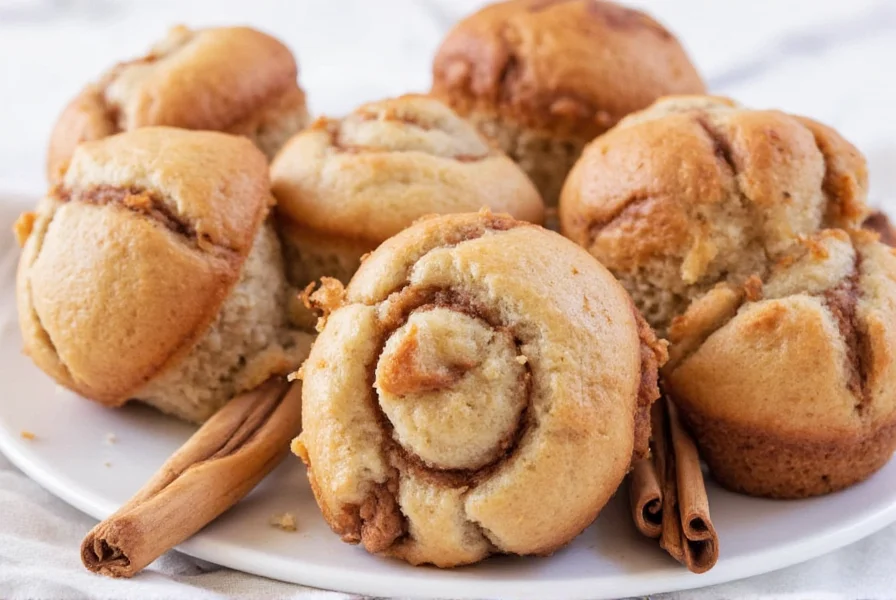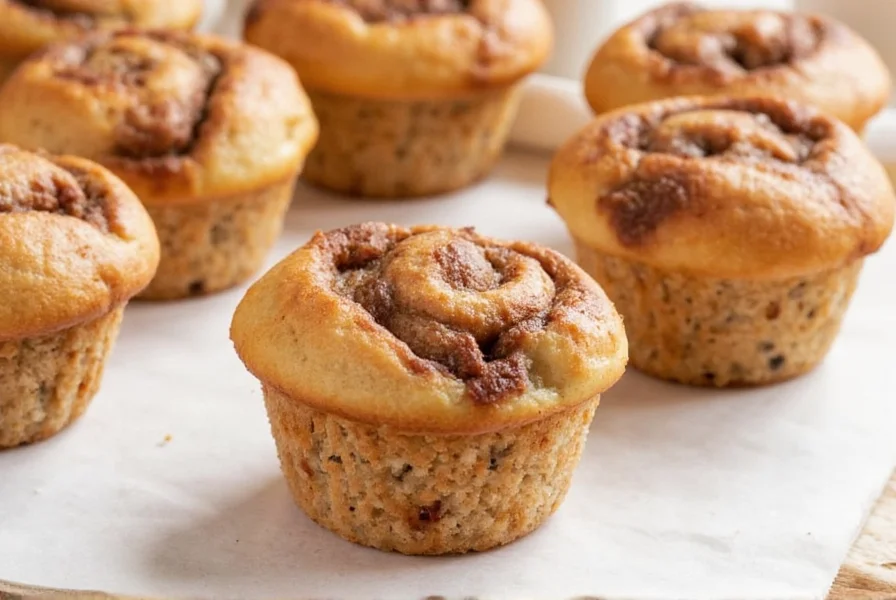For baking enthusiasts seeking the perfect balance between convenience and decadence, cinnamon bun muffins represent the ideal solution. These hybrid treats deliver all the comforting flavors of traditional cinnamon buns in a portable, portion-controlled format that bakes faster and requires less shaping expertise. Unlike regular cinnamon rolls that demand precise rolling and rising techniques, muffins simplify the process while maintaining that signature swirl of cinnamon-sugar goodness.
The Science Behind Perfect Cinnamon Bun Muffins
Understanding the chemistry behind successful cinnamon bun muffins separates good results from exceptional ones. The key lies in balancing three critical elements: the batter consistency, filling distribution, and baking temperature. Professional bakers know that muffin batter for this application should be slightly thicker than standard muffin batter to properly hold the wet cinnamon filling without sinking to the bottom.
When preparing easy cinnamon bun muffins from scratch, the ideal batter consistency resembles a thick cake batter rather than a pourable pancake mixture. This thickness creates structure that prevents the cinnamon-sugar filling from pooling at the bottom during baking. The optimal baking temperature sits between 350-375°F (175-190°C), hot enough to set the structure quickly but not so hot that the exterior browns before the interior cooks through.

Essential Ingredients and Their Roles
Creating the best cinnamon bun muffins requires understanding each ingredient's purpose:
| Ingredient | Function | Professional Tip |
|---|---|---|
| All-purpose flour | Provides structure | Spoon and level flour; don't pack it |
| Buttermilk | Creates tender crumb | Substitute with milk + 1 tsp vinegar if needed |
| Brown sugar | Moisture and caramel notes | Pack firmly for consistent measurements |
| Cinnamon | Signature flavor | Use Ceylon cinnamon for complex flavor profile |
| Cream cheese | Richness in glaze | Full-fat blocks work better than tubs |
Step-by-Step Recipe for Perfect Results
Follow these professional techniques for soft cinnamon bun muffins that stay moist for days:
- Prepare the filling first - Mix 1 cup brown sugar with 2 tablespoons cinnamon and 1/4 cup melted butter. Set aside to slightly cool.
- Whisk dry ingredients separately - Combine 2 cups flour, 1/2 cup sugar, 2 teaspoons baking powder, and 1/2 teaspoon salt.
- Mix wet ingredients gently - Beat 1 egg, 1 cup buttermilk, and 1/4 cup melted butter until just combined.
- Fold components together - Add dry ingredients to wet, folding only until no streaks remain (overmixing creates tough muffins).
- Layer strategically - Fill muffin cups one-third full with batter, add 1 tablespoon filling, then top with remaining batter.
- Bake precisely - 18-20 minutes at 360°F (182°C) until toothpick comes out clean.
Proven Techniques for Bakery-Quality Results
Professional bakers rely on these cinnamon bun muffins baking secrets that home cooks often overlook:
- The temperature test - Remove muffins when center springs back lightly to touch, not when edges pull from pan
- Filling distribution - Create a small well in the bottom batter layer before adding filling to prevent sinking
- Glaze application - Drizzle warm (not hot) muffins with glaze for perfect adhesion without melting
- Butter quality matters - Use European-style butter with higher fat content for richer flavor
Troubleshooting Common Problems
Even experienced bakers encounter issues with cinnamon bun muffins vs regular cinnamon rolls. Here's how to fix them:
- Filling sinks to bottom - Batter too thin; add 2-3 tablespoons extra flour to batter
- Dry texture - Overbaked or too much flour; measure flour properly and check early
- No visible swirls - Not enough filling layers or overmixed when adding filling
- Glaze soaks in completely - Applied to muffins that were too hot; wait 5 minutes
Delicious Variations to Try
Once you've mastered the classic cinnamon bun muffins recipe, experiment with these professional variations:
- Nutty crunch - Add 1/4 cup chopped pecans or walnuts to the filling
- Apple spice - Mix 1/2 cup finely diced apples into the filling
- Orange zest - Add 1 tablespoon orange zest to batter for citrus notes
- Maple glaze - Substitute maple syrup for half the powdered sugar in glaze
Storage and Reheating for Maximum Freshness
Proper cinnamon bun muffins storage tips maintain quality for up to 5 days:
- Room temperature - Store in airtight container with paper towel to absorb moisture
- Refrigeration - Only necessary in humid climates; brings muffins to room temperature before serving
- Freezing - Wrap individually in plastic, then place in freezer bag for up to 3 months
- Reheating - 10-15 seconds in microwave or 5 minutes at 300°F (150°C) in oven
Frequently Asked Questions
Can I make cinnamon bun muffins without buttermilk?
Yes, you can substitute buttermilk by adding 1 tablespoon of white vinegar or lemon juice to 1 cup of regular milk. Let it sit for 5 minutes to thicken before using. This creates a similar acidic environment that reacts with baking powder for proper rise and tender texture.
Why do my cinnamon bun muffins come out dry?
Dry muffins typically result from overbaking, too much flour, or insufficient fat content. Measure flour properly by spooning into measuring cup and leveling off (don't scoop). Check muffins 2 minutes early as oven temperatures vary. Ensure you're using the full amount of butter or oil specified in the recipe for proper moisture.
How can I prevent the cinnamon filling from sinking to the bottom?
To prevent sinking filling, create a small well in the bottom layer of batter before adding the filling. Use a slightly thicker batter by adding 1-2 tablespoons extra flour to the dry ingredients. The filling should have enough melted butter to be spreadable but not liquid. Fill muffin cups no more than 2/3 full to allow room for expansion during baking.
Can I prepare cinnamon bun muffin batter ahead of time?
Yes, you can prepare the batter and filling separately the night before. Store batter covered in the refrigerator and let it sit at room temperature for 20 minutes before using. The filling can be stored at room temperature. Assemble just before baking for best results, as the chemical leaveners start working once wet and dry ingredients combine.
What's the ideal baking temperature for cinnamon bun muffins?
The optimal baking temperature for cinnamon bun muffins is 360°F (182°C). This temperature provides the perfect balance between setting the structure quickly and allowing even baking without over-browning the exterior. Standard 350°F works but may require 2-3 extra minutes, while 375°F risks drying out the edges before the center cooks through.











 浙公网安备
33010002000092号
浙公网安备
33010002000092号 浙B2-20120091-4
浙B2-20120091-4